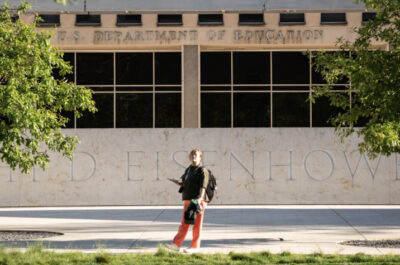The acting captain of the Santa Clarita Valley Sheriff’s Station gave rave reviews for the latest boost to his law-enforcement toolkit from the city — nearly three dozen automated license-plate readers — even as privacy advocates pursue legal questions in federal court.
Lt. Brandon Barclay described the Flock cameras, which scan thousands of cars at intersections and instantly report any being sought by deputies or officers, as a “tremendous” 21st-century crime-fighting technology.
As of March, Santa Clarita had 35 of the cameras installed throughout the city, at locations they’d rather not talk about for the safety of the cameras and the public.
The cameras are not just about tracking stolen cars, a crime that’s trending down based on the latest countywide and station-specific reports from the L.A. County Sheriff’s Department: In the city of Santa Clarita, grand theft auto reports are down about 7%, and countywide, it’s down 18.5% year to date.
The cameras also offer potential help in situations like Amber Alerts for missing children or when deputies are in pursuit of a fleeing suspect, and someone happened to catch and report a license plate number, Barclay said.
“I could not be more happy with the numbers that I have here,” he said, adding he could attribute 12 arrests, 15 recovered stolen vehicles and two “investigative leads” since March 1, adding they aren’t just “run-of-the-mill arrests.”
Barclay mentioned two off the top of his head as anecdotes that showed how they helped: The first, an armed and dangerous robbery suspect from Burbank was detected on arrival in the SCV by deputies, thanks to the camera, and the suspect was taken into LASD custody.
“Another one was an investigative lead that was a stolen vehicle … a Kia that was taken from Lancaster-Palmdale, they come here and do a series of smash-and-grab burglaries,” Barclay said. The cameras gave deputies evidence to file a search warrant, which gathered more evidence and helped detectives link their suspects to at least 28 thefts throughout the region.
“It’s the intangibles, meaning that cars that are coming down here stealing catalytic converters, or they’re going to commit a burglary in one of our higher end communities,” he said. The information can be tracked and then pieced together.
Countywide, reports of car thefts are down nearly 19%, from 5,680 to 4,625 in the year-to-date comparison through April 1.
A federal lawsuit challenging the use of the cameras in an East Coast city could have ramifications for Santa Clarita’s use of them.
The Institute for Justice, which is leading a lawsuit against the city of Norfolk, Virginia, said that city’s installation of 172 Flock cameras represents the authorization of warrantless surveillance by the city and the police department. For comparison, Norfolk has a population of approximately 231,000 in 2024, about 7,000 more than Santa Clarita’s most recent figure available in 2023.
“These powerful cameras photograph every car that passes them,” according to the Institute for Justice’s October complaint, which argues that the cameras make the violation of residents’ Fourth Amendment rights against unreasonable search and seizure too “easy.”
“Unlike a police officer posted at an intersection, the cameras never blink, they never sleep and they see and remember everything. Every passing car is captured, and its license plate and other features are analyzed using proprietary machine learning programs, like Flock’s ‘Vehicle Fingerprint,’” according to the complaint filed by Institute for Justice.
When the city of Santa Clarita first approved the contract, Councilman Jason Gibbs asked questions about the cameras’ capabilities to store and track information, as well as deputies’ abilities to access it.
“There’s a couple answers to that,” said then-station Capt. Justin Diez in November, when the Flock contract was approved. “Ultimately, the data is going to be accessed whenever there’s a ‘hit,’” he said.
“The flip side of that, what I think you’re getting more toward, is the investigative part of it,” he added, “and where that would come into play would be if a crime has happened, you know, a couple blocks away, and there’s only a partial description of the car, detectives could later, up to 30 days — because the data is only kept for 30 days and then it’s wiped from the servers … then the detective could work backward and figure out what that plate is,” he said.
A federal judge is allowing the lawsuit to proceed and a trial date is expected in October. City officials have said they are aware of the legal challenges but no “final determinations” had been made.








